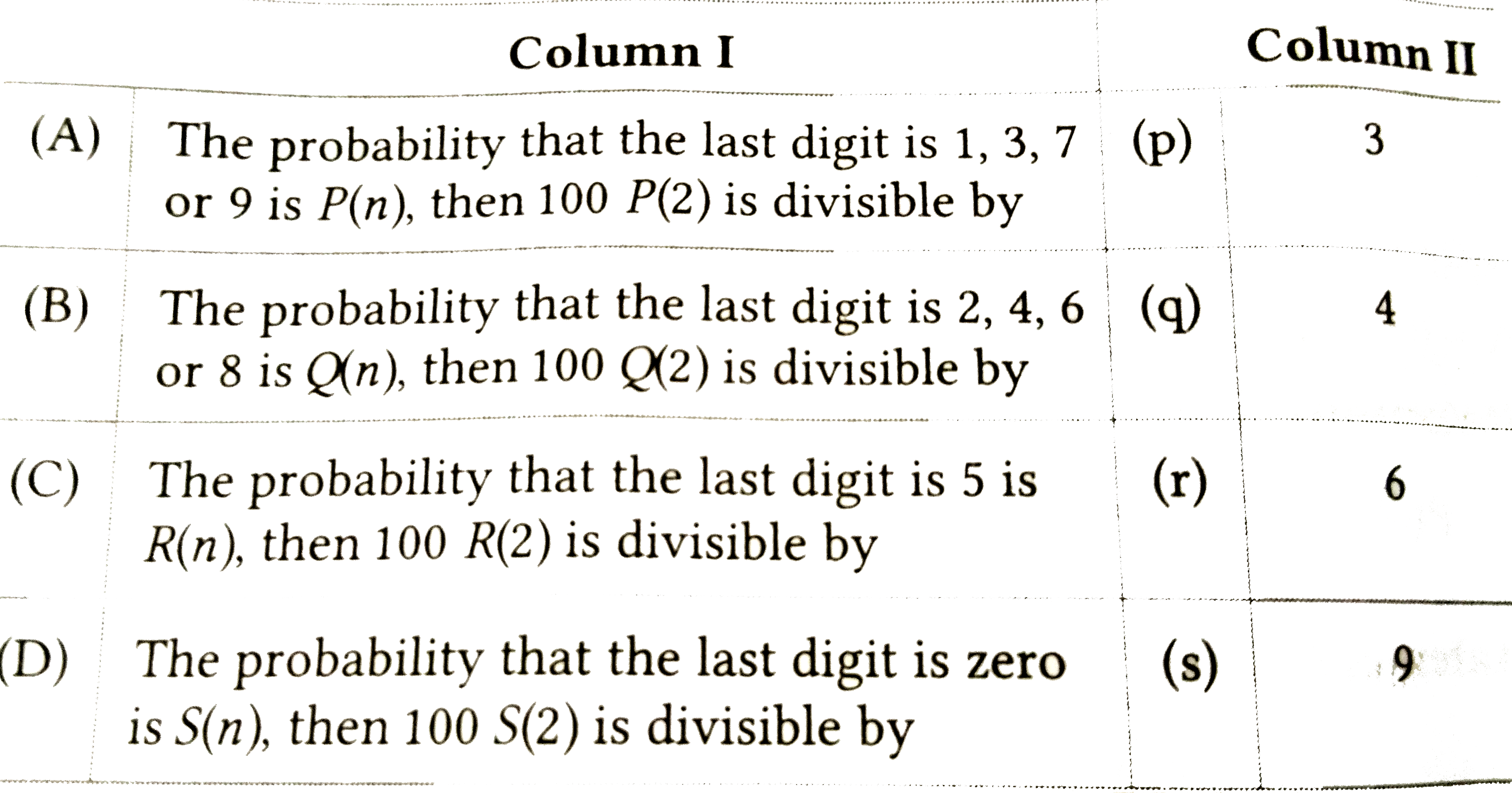If four whole numbers taken at random are multiplied together, then find the probability that the last digit in the product is 1,3,7 or 9.
To find the probability that the last digit in the product of four randomly selected whole numbers is 1, 3, 7, or 9, we can follow these steps:
Step 1: Identify the possible last digits
The last digit of any whole number can be one of the digits from 0 to 9. Therefore, the possible last digits are:
0, 1, 2, 3, 4, 5, 6, 7, 8, 9.
Step 2: Determine the favorable outcomes
We want the last digit of the product to be either 1, 3, 7, or 9. Thus, the favorable outcomes for the last digit are:
1, 3, 7, 9.
Step 3: Calculate the probability of selecting a favorable last digit
The total number of possible last digits is 10 (0 to 9). The number of favorable last digits is 4 (1, 3, 7, 9). Therefore, the probability of selecting a last digit that is either 1, 3, 7, or 9 is:
P(favorable last digit)=Number of favorable outcomesTotal outcomes=410=25.
Step 4: Calculate the probability for four numbers
Since we are selecting four whole numbers, and the last digit of each number must also be 1, 3, 7, or 9 for the product to have a last digit of 1, 3, 7, or 9, we can multiply the probabilities for each of the four numbers:
P(last digit of product is 1, 3, 7, or 9)=P(favorable last digit)4=(25)4.
Step 5: Simplify the expression
Calculating (25)4:
(25)4=2454=16625.
Final Answer
Thus, the probability that the last digit in the product of four whole numbers is 1, 3, 7, or 9 is:
16625.
---
The last digit of any whole number can be one of the digits from 0 to 9. Therefore, the possible last digits are:
0, 1, 2, 3, 4, 5, 6, 7, 8, 9.
We want the last digit of the product to be either 1, 3, 7, or 9. Thus, the favorable outcomes for the last digit are:
1, 3, 7, 9.
The total number of possible last digits is 10 (0 to 9). The number of favorable last digits is 4 (1, 3, 7, 9). Therefore, the probability of selecting a last digit that is either 1, 3, 7, or 9 is:
P(favorable last digit)=Number of favorable outcomesTotal outcomes=410=25.
Since we are selecting four whole numbers, and the last digit of each number must also be 1, 3, 7, or 9 for the product to have a last digit of 1, 3, 7, or 9, we can multiply the probabilities for each of the four numbers:
P(last digit of product is 1, 3, 7, or 9)=P(favorable last digit)4=(25)4.
Calculating (25)4:
(25)4=2454=16625.
Thus, the probability that the last digit in the product of four whole numbers is 1, 3, 7, or 9 is:
16625.
Similar Questions
If four whole numbers taken art random are multiplied together, then find the probability that the last digit in the product is 1,3,7, or 9.
View SolutionIf n integers taken at random are multiplied together , then the probability that the last digit of the product is 1, 3, 7, or 9 is a. 2n/5n b. 4n−2n/5n c. 4n/5n d. none of these
View SolutionIf n positive integers are taken at random and multiplied together, then the probability that the last digit of the product is 2,4,6 or 8, is
View SolutionIf n positive integers taken at random are multiplied together.

View SolutionIf 5 positive integers are taken at random and multiplied together. The probability that the last digit of the product is 2,4,6,8 is
View SolutionIf any four numbers are slected and they are multiplied, then the probability that the last digit will be 1,3,5or7 is
View SolutionFour positive integers are taken at random and are multiplied together. Then the probability that the product ends in an odd digit than 5 is
View SolutionAn integer is chosen at random and squared. Find the probability that the last digit of the square is 1 or 5.
View SolutionIf out of 20 consecutive whole numbers two are chosen at random, then find the probability that their sum is odd.
View SolutionIf out of 20 consecutive whole numbers two are chosen at random, then find the probability that their sum is odd.
View Solution
